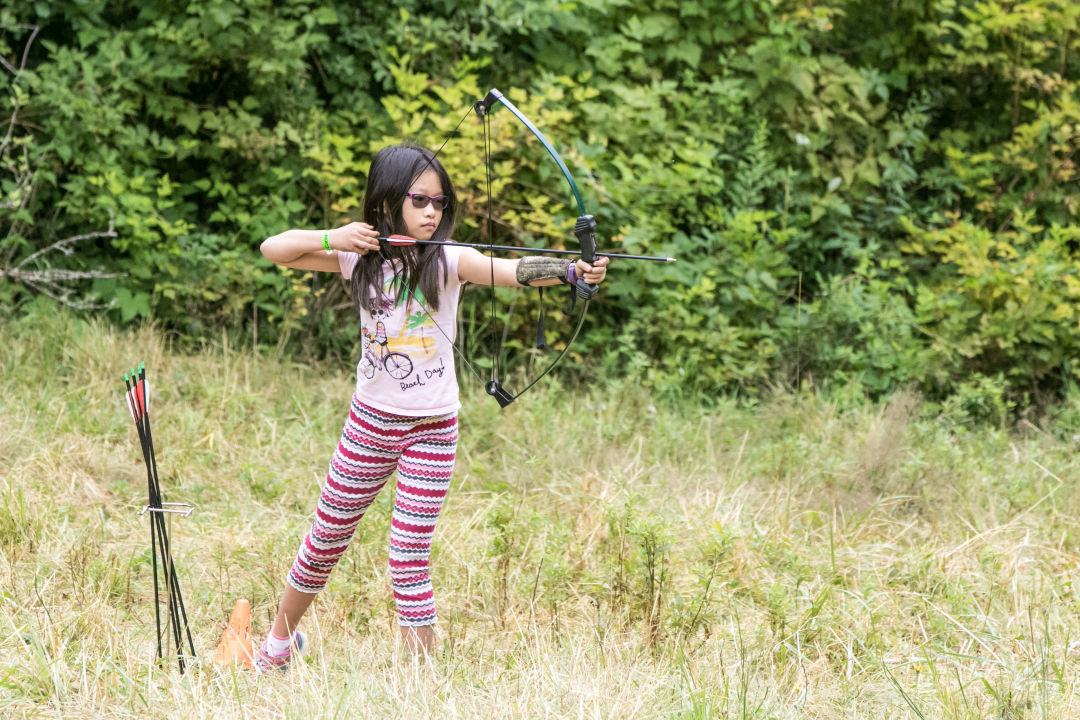Summer Camps in Oregon Will Be (Mostly) Open This Year

Aiming for the target in pre-Covid times at Portland Audubon camp.
Image: Courtesy Portland Audubon
Summer camp, a treasured rite of passage for some families, will look different this year in Oregon, yet again.
And yet, camp operators say that’s progress from the lost summer of 2020 when many camps suspended or canceled programming during the first uncertain months of the pandemic.
A year later, many say they are back, though with some significant changes at hand.
One big caveat: the Oregon Health Authority still has a ban on overnight camps, though they are permitted in many other states. It’s possible that could be revised, and some classic sleepaway camps, including Camp Namanu near Sandy and Camp Westwind on the Oregon Coast, are accepting reservations in anticipation of being allowed to open. Others, though, including the Oregon Museum of Science & Industry, are pausing their overnight camps for the second summer in a row.
Still, for many kids, summer camp should offer something of a reset, camp directors said—a chance to be off the computer and back in person with their peers after a school year spent mostly staring at a screen. Here’s what to know about the upcoming camp season.
- To comply with state rules on how many kids can be together in a single cohort, many camps are reducing the size of their programs, so sign-ups may already be full or require some vigilance/hovering over the keyboard at dawn. For example, Portland Audubon usually has group sizes of between 13 and 24 for its all-outdoors, all the time camps. This year, they capped the group sizes at 10, says Tim Donner, the nonprofit’s senior educator for youth & family programs. Their camps are nearly full as a result, though some spots are being saved for scholarship campers. And if the state revises its rules on distancing—mandating that kids need to stay three feet apart instead of six feet, for example—the program might be able to open up more slots. (Going small has been hard on the bottom line—Donner says was it was “eye-opening just to see that it is much harder to do more than break even when you have smaller groups.”)
- Expect virus control measures to be firmly in place (though these may evolve as the numbers of those who are fully vaccinated continue to rise). According to the American Camps Association, a survey of 486 camps in 2020 found just 102 identifiable Covid cases among 90,000 campers, when mitigation strategies were in place. In other words, prepare your kid to wear their mask, wash their hands, and keep some distance. And expect that as much time will be spent outdoors as possible (a challenge in particular for tech/robotics camps.) For a good rundown of what to expect, see the Portland Parks & Recreation Department’s description of their summer nature camps, open to ages 5-12 at parks around the city, which have yet to open for registration.
- Be prepared for things to change. Caroline Schweibert, who runs the Portland Drama Club, says she went back and forth over whether to even try to offer camp this summer, especially since her program involves kids singing and dancing together in a full-length musical production. She considered alternate formats, but really wanted to stick with the experience of staging a show: “I believe kids benefit from starting with nothing and finishing with a completed project. That’s the fastest way to teach kids that they can do anything.” So she got creative, figuring out how to erect a temporary outdoor stage, and how to work it so that no kids would share costumes or props. But she’s also letting parents know that when onstage during the performance, kids won’t be masked so that the audience can hear them. She’s been surveying families to assess their comfort levels with her plans and says she’s open to adjusting on the fly.
One big difference between summer 2021 and summer 2020 is that counselors will have at least been cleared to get a vaccine by summer. And the CDC’s recent release of guidance for those who are fully vaccinated says that they can safely unmask around small groups of low-risk individuals, though whether that applies to a summer camp group is unclear.
Donner says he and his colleagues figured their best path forward was to design a camp that was in compliance with the strictest guidance, figuring that it could always be eased, but that it would be hard to go the other way.
“We didn’t want to have families sign up in January and then cancel on them in May,” he says. “The social, emotional piece of kids needing to connect outside of their homes and see their peers is really valuable.”




